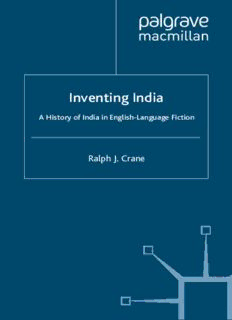
Inventing India: A History of India in English-Language Fiction PDF
Preview Inventing India: A History of India in English-Language Fiction
Inventing India A History of India in English-Language Fiction Ralph J. Crane INVENTING INDIA This page intentionally left blank Inventing India A History of India in English-Language Fiction Ralph J. Crane © Ralph]. Crane 1992 All rights reserved. No reproduction, copy or transmission of this publication may be made without written permission. No paragraph of this publication may be reproduced, copied or transmitted save with written permission or in accordance with the provisions of the Copyright, Designs and Patents Act 1988, or under the terms of any licence permitting limited copying issued by the Copyright Licensing Agency, 90 Tottenham Court Road, London W1P 9HE. Any person who does any unauthorised act in relation to this publication may be liable to criminal prosecution and civil claims for damages. First published 1992 by THE MACMILLAN PRESS LTD Houndmills, Basingstoke, Hampshire RG21 2XS and London Companies and representatives throughout the world ISBN 0-333-56363-8 A catalogue record for this book is available from the British Library. Printed and bound in Great Britain by Antony Rowe Ltd, Chippenham and Eastbourne Transferred to digital printing 2005 For Joy, of course, and for Jennifer Livett This page intentionally left blank Contents List of Plates viii Prefatory Note ix Acknowledgements x 1 Introductory: Fiction as History 1 2 The Great Revolt: 1857 11 3 The Period of the Great Game 55 4 Bridges 75 5 Swaraj 100 6 Partition 136 7 The End of the Old Order 152 8 The Chutnification of History 170 9 Epilogue 190 Notes and References 193 Select Bibliography 201 Index 208 vii List of Plates 1. Thomas Jones Barker, The Relief of Lucknow 2. 'The Courtyard of the Secunderbagh' 3. Abraham Solomon, The Flight from Lucknow 4. The Jewel in Her Crown 5. Sir Edwin Landseer, The Monarch of the Glen . 6. Jean Antoine Watteau, L'Embarquement pour L'fle de Cythere 7. John Everett Millais, The Boyhood of Raleigh viii Prefatory Note In the interests of consistency, I have referred to the British commun ity in India as Anglo-Indians throughout this study. Similarly, I have used the term Eurasian to describe the mixed-race community, de spite the fact that after the census of 1911 these people were officially recognised as Anglo-Indians. Many Indian words have no definitive English spelling. As Olivia writes in O. Douglas's Olivia in India: 'One trait [Hindustani] has which appeals to me is that one can spell it almost any way one likes'. I have been consistent throughout my own text, but various spellings of words like chapati and Muslim appear in quotations. ix
Description: